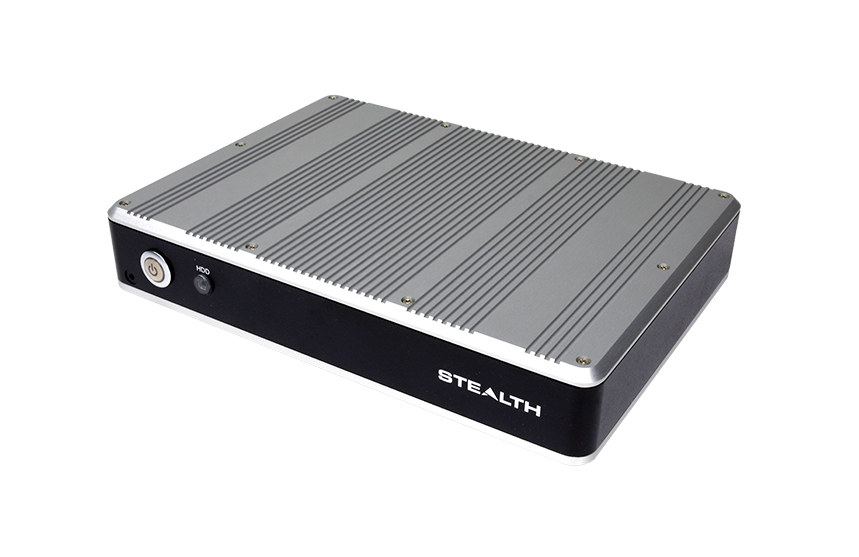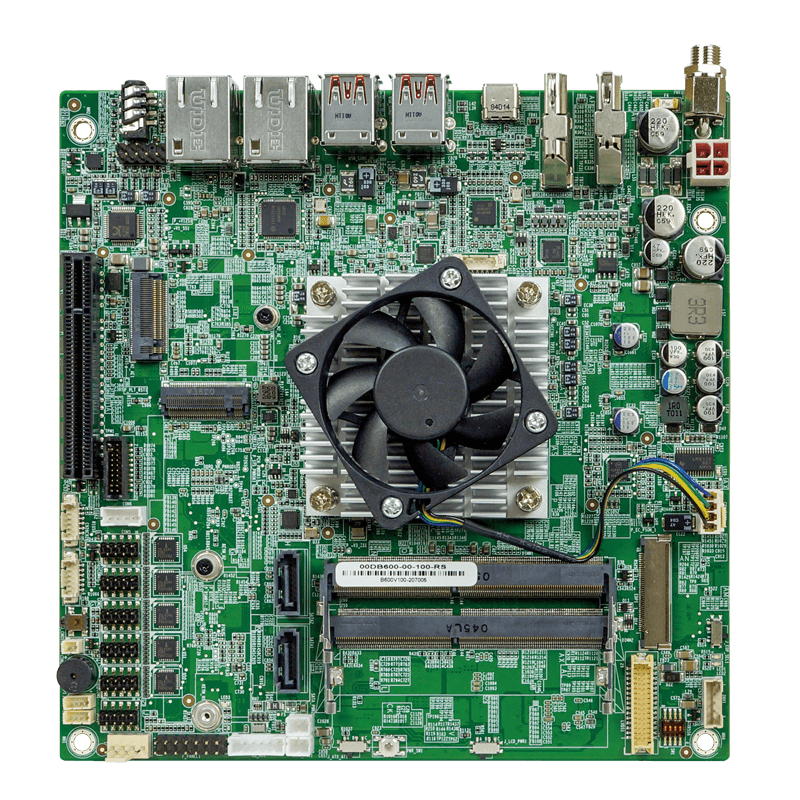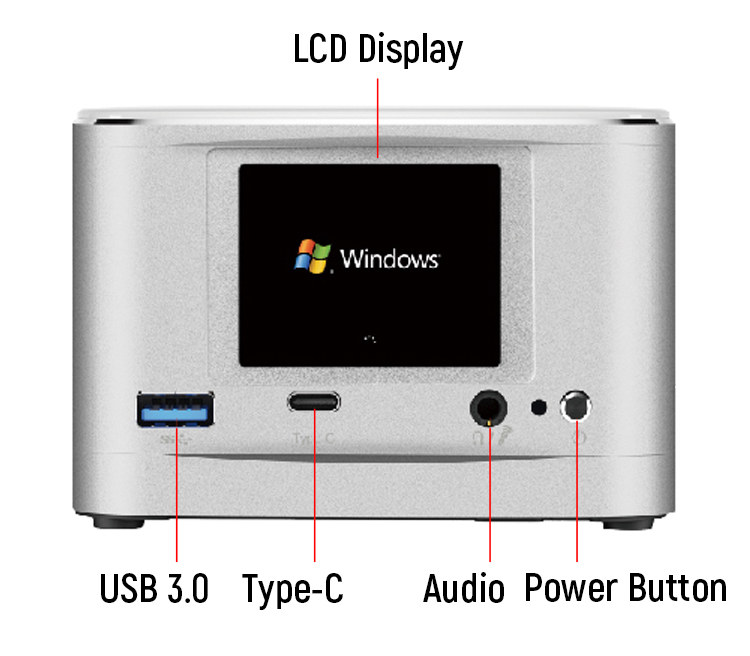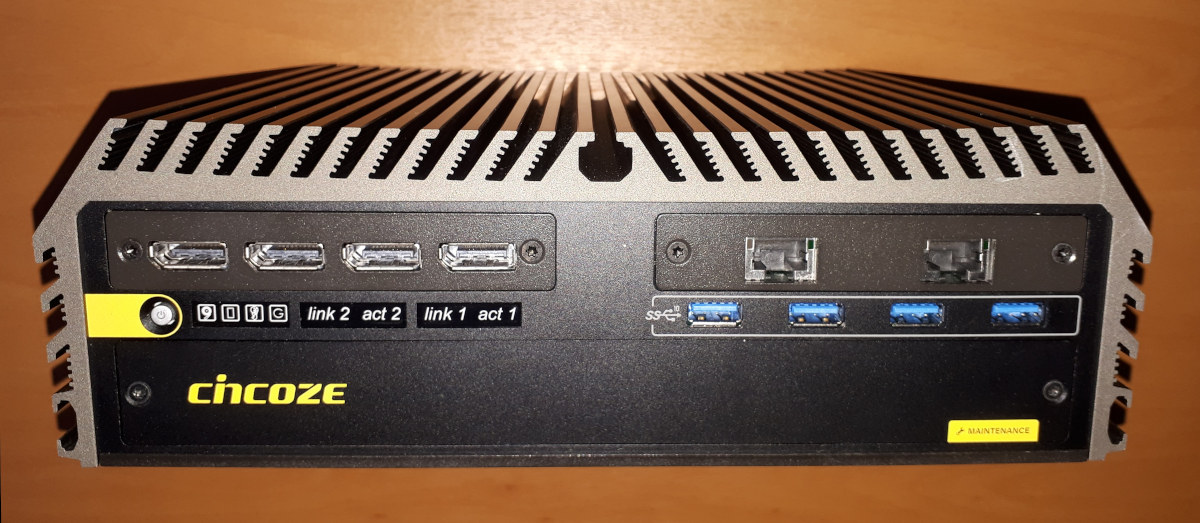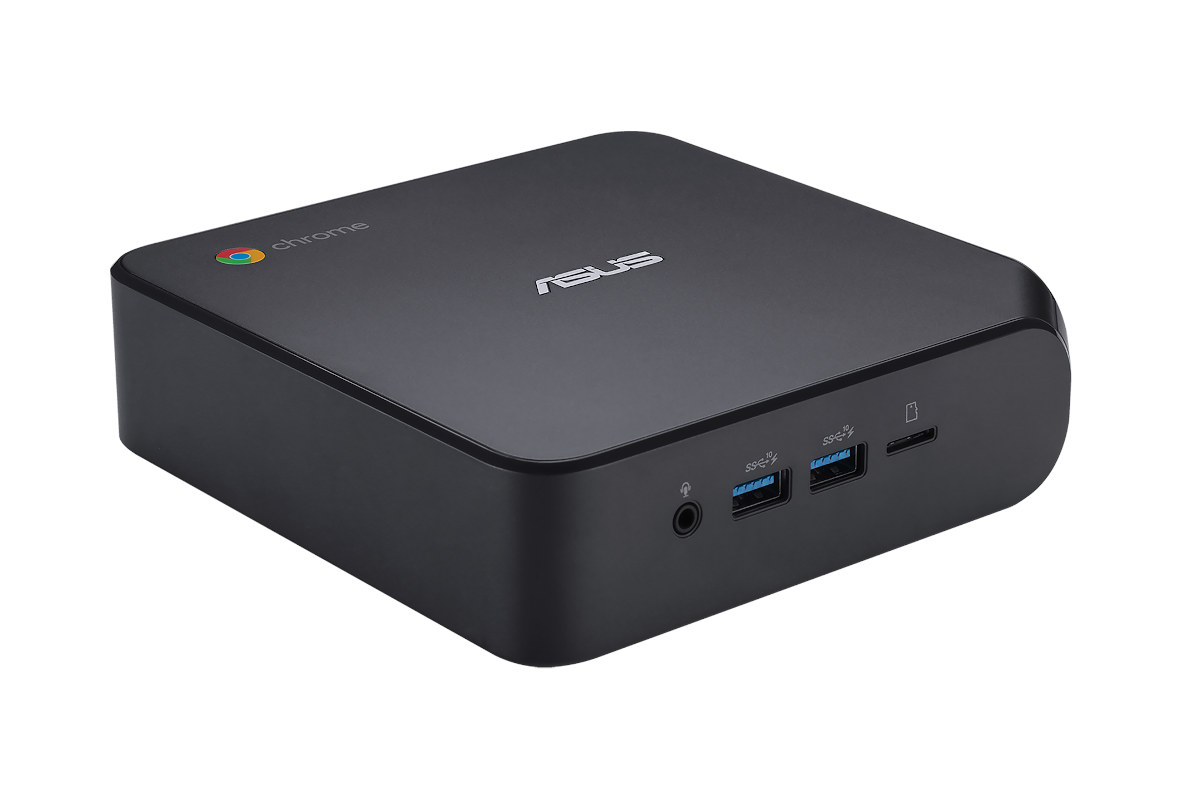We’ve covered plenty of Whiskey Lake-based mini PC‘s and SBC‘s, but most of them are made for the home or the office, except for some designed with a wider temperature range for industrial and factory environments. But Stealth is going further with WPC-905 IP67 waterproof mini PC that’s completely sealed and fanless making it suitable for harsher environments, including marine applications. The rugged computer comes with a choice of Intel Celeron and Core processors and supports variable DC input from 9V to 48V DC via an M12 connector. Stealth WPC-905 IP67 mini PC specifications: SoC (one or the other) – all from the Whisky Lake Embedded family Intel Celeron 4305UE dual-core processor @ 2GHz with Intel UHD Graphics 610; 15W TDP Intel Core i3-8145UE dual-core/quad-thread processor @ 2.2GHz / 3.9GHz (Turbo) with Intel UHD Graphics 620; 15W TDP Intel Core i5-8365UE quad-core/octa-thread processor @ 1.6GHz / 4.1GHz (Turbo) with Intel […]
Mini-ITX SBC with Tiger Lake UP3 CPU offers dual 2.5GbE, quad display support
IEI launched tKINO-ULT6 is a Thin Mini-ITX SBC that comes with an 11th generation Intel core processor part of the Tiger Lake-UP3 CPU family. The tKINO-ULT6 Mini-ITX SBC also supports quadruple independent displays, SATA 6Gb/s, dual Intel 2.5GbE, HD audio, and RoHS. It can handle a wide range of input DC power from 9V to 36 V. The tKINO-ULT6 SBC is expected to be found in CNC (Computer Numerical Control) machines, real-time controls, human-machine interfaces, tool applications, medical imaging, and other applications requiring high resolution. Key Features of the tKINO-ULT6 Mini-ITX SBC Mini-ITX form factor with 11th Gen. Intel Tiger Lake UP3 Embedded processor, support for DDR4-3200 memory Video Output – Four independent displays via HDMI, DP, eDP/LVDS, USB4 Networking Dual Intel 2.5GbE LAN M.2 A key for WIFI+Bluetooth (PCIe x1/USB 2.0), M.2 M key for Storage (PCIe x2/SATA) Expansion – PCIe x8 Gen 4.0 slot The tKINO-ULT6 Mini-ITX SBC […]
Lenovo LAVIE MINI 8-inch mini laptop to come with optional desktop and gaming docks
In the last two years or so, we’ve seen several so-called mini laptops with screen sizes from 5-inch to 8-inch mostly from smaller companies like GPD and One Netbook, but also CHUWI to a lesser extent. Now Lenovo has entered the fray with LAVIE MINI mini laptop powered by an Intel Tiger Lake processor and equipped with an 8-inch touchscreen display. The device is also offered with optional accessories including an HDMI desktop docking station and a gaming dock with two game controllers. Lenovo LAVIE MINI preliminary specifications: SoC – Intel Tiger Lake with Intel Xe graphics up to Intel Core i7-1180G7 SoC System Memory – 16GB LPDDR4x-4266 dual-channel memory (soldered) Storage – 256GB SSD Display – 8-inch touchscreen display with 1920 x 1200 resolution, 400 nits brightness Audio – 1.5W stereo speakers Camera – IR camera with Windows Hello face recognition Connectivity – WiFi 6 & Bluetooth 5.1 User […]
Emini V6 mini PC integrates a tiny LCD display for CPU usage, temperature…
Emini V6 is a desktop mini PC powered by a 15W Intel Core i5-7200U Kaby Lake processor, that looks like most other comparable computers, except for one detail: a tiny LCD display is integrated into one side of the case. At first, it seemed non-sensical, especially the photos should a Windows logo on the photos, but it made a little more sense once the company explained it was to display CPU usage, temperature, and other system information. Emini V6 (MR-V6-I5K72D4U-LCD) specifications: SoC – Intel Core i5-7200U dual-core Kaby Lake processor @ 2.5GHz / 3.1GHz with 3MB Cache, Intel HD Graphics 620; TDP: 15W System Memory – 2x DDR4 SO-DIMM slots up to 32GB RAM (dual-channel) Storage – M.2 2242 SSD and 2.5-inch SATA SSD support Video Output 1x HDMI 1.4a up to 4096 x 2304 @ 24Hz 1x mini DisplayPort (mDP) up to 4096 x 2304 @ 60Hz Display – […]
Year 2020 in review – Top ten posts and stats
It’s this time of the year when we look back at what happened, and what may be next. 2020 did not pan out as planned in more ways than one, but there were still some interesting developments. Based on 2019 announcements, 2020 was promising to be an exciting year for Amlogic and Rockchip with the expected launch of RK3588 and S908X high-end processors for 8K capable devices, but we’ll have to wait for 2021 for this to happen. Instead, the most interesting processor of the year from the Allwinner, Amlogic, and Rockchip offerings was probably Amlogic S905X4 processing adding AV1 hardware decoding. As pointed out in our “RISC-V 2020 highlights” post, it was a fairly eventful year for RISC-V architecture, although there’s still a long road ahead, especially for application processors. We had seen some general-purpose and Bluetooth RISC-V MCUs in 2019, but 2020 saw the launch of the first […]
Cincoze GM-1000 Embedded GPU Computer Review
Cincoze GM-1000 is an industrial embedded GPU computer. It is highly expandable including supporting an embedded MXM GPU. As a rugged computer, it can either be passively cooled or actively cooled with add-on fans. It can support an operating temperature ranging from -40°C – 70°C and is also able to survive being dropped or hit with a vibration/shock tolerance of 5G/50G. It is marketed as having all the features required for a compact, reliable, and high-performance computing system for field applications in machine vision, image processing, and artificial intelligence. In this review, I’ll cover some performance metrics from both Windows and Ubuntu and also discuss the thermals. Hardware Overview The model loaned by Cincoze for review came with an Intel Core i7-9700TE which is an eight-core 8-thread 1.80 GHz Coffee Lake-R processor boosting to 3.80 GHz with Intel’s UHD Graphics 630. It also came with an NVIDIA Quadro Embedded P2000 […]
OneGx1 Pro 7-inch 5G mini laptop features Intel Core i7-1160G7 processor
Last summer, One Netbook unveiled OneGx1 mini laptop powered by an Intel Core i5-10210Y Amber Lake processor with support for WiFi 6, 4G LTE, and/or 5G connectivity. The company has now come up with an update with a similar design, except OneGx1 Pro mini laptop features a more powerful Intel Core i7-1160G7 Tiger Lake UP 4 processor with four cores clocked at up to 4.4 GHz, and a 96EU Intel Iris Xe Graphics. OneGx1 Pro mini laptop specifications: SoC – Intel Core i7-1160G7Y Tiger lake UP4 quad-core/octa-thread processor @ 1.2 GHz (base) / 4.4 GHz (turbo one core) / 3.6 GHz (turbo all cores) with 96 EU Intel Iris Xe Graphics @ 1.1 GHz; 12MB cache; 7-15W TDP System Memory – 16GB LPDDR4/4X-4266 Storage – 512GB M.2 NVMe SSD, M.2 socket for an additional M.2 2242 SSD up to 2TB, MicroSD card slot Display – 7-inch 1920 x 1200 multi-touch […]
ASUS Chromebox 4 features Intel Comet Lake processor, WiFi 6, up to 16GB RAM
Chrome OS devices, be it Chromebook laptops, Chomebox mini PCs, or Chromebit PC sticks, used to be relatively low-cost devices designed to run the Chrome browser. But over the years. the versatility of the platform has increased with more powerful, yet still with low-power consumption, hardware, and improved software with support for Android apps, the Google Play Store, and even Linux programs. ASUS Chromebox 4 mini PC should be able to handle all those tasks pretty well, thanks to a choice of Intel Comet Lake processors ranging from a dual-core Intel Celeron 5205U to a quad-core Core i7-10510U with up to 16GB RAM, 64GB eMMC flash, and an M.2 socket that will be fitted to either 128GB or 256GB SATA SSD. The device offers Gigabit Ethernet and WiFi 6 connectivity, also has the ability to drive up to three displays thanks to two HDMI 2.0 ports, and a USB 3.2 […]


